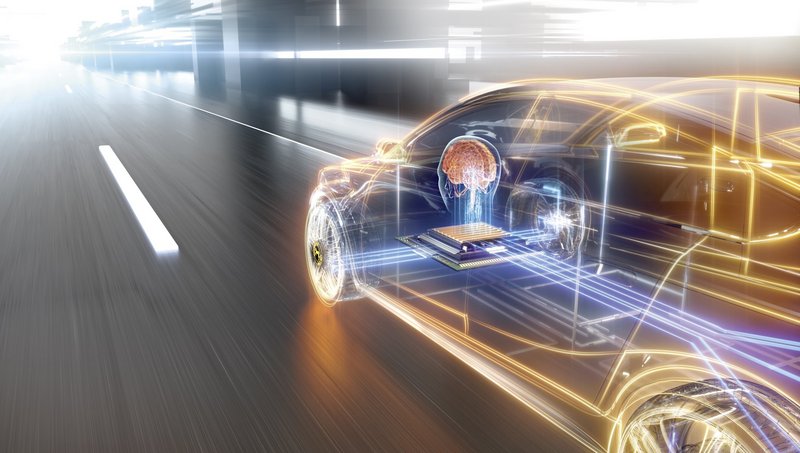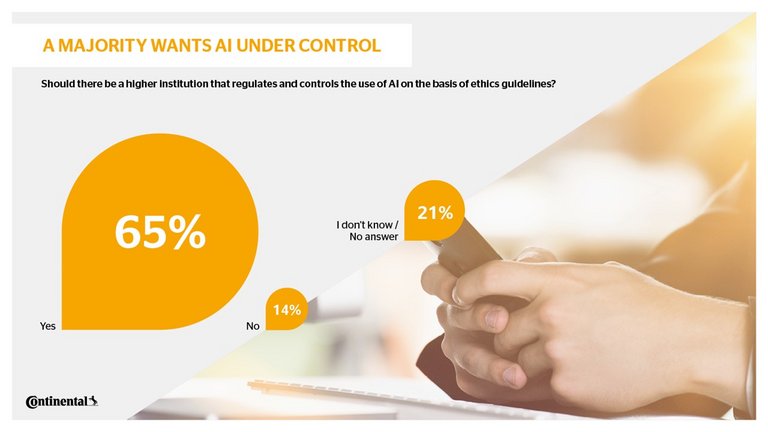Artificial Intelligence and the Mobility of Tomorrow
A Driving Force Behind the Safe, Intelligent and Sustainable Mobility of Tomorrow
Artificial intelligence (AI) has become a key technology in the automotive sector. The market for artificial intelligence in the automotive industry is estimated at $2.3 billion and, according to research institute Mordor Intelligence, is expected to reach $16.2 billion by 2026. Continental recognized artificial intelligence early on as a driving force for its future business – and is responsibly harnessing the power of the technology in its products and processes. On November 30, 2022, the AI bot ChatGPT was introduced to the world, once again making artificial intelligence the center of attention.
“AI is absolutely essential to meet the requirements of current megatrends”
This is particularly true for industry, where the use of AI is currently spurring major leaps in innovation. A prime example is the automotive sector. Gilles Mabire, automotive chief technology officer (CTO) at Continental, says: “AI is absolutely essential for Continental to meet the requirements of current megatrends such as automated driving, connectivity, electrification and shared mobility. It offers us tremendous opportunities to guide our company and our customers into the future of mobility.” (See “Three Questions for Gilles Mabire” below.)
A key reason for the growth of AI in the automotive sector is automated and autonomous driving, which would not be possible without this technology.
In combination with vehicle sensors, AI is needed to reliably detect objects in the vicinity of a car in real time. AI-based driver assistance systems can maneuver vehicles safely even in the heaviest urban traffic and help avoid accidents. When connected to other vehicles and infrastructure, AI applications reduce congestion and are key solutions for future mobility in both the passenger car and truck segments.
The commercial vehicle sector in particular offers a huge wealth of potential, and at the end of April 2023 Continental announced an exclusive partnership with US company Aurora. Together, the two partners will launch the first commercially scalable generation of Aurora’s hardware and software system – the Aurora Driver – in the USA. This will involve developing, validating, supplying and servicing the autonomous system for the trucking industry. The system will be available for carriers and commercial fleet operators across the USA and will help reduce costs to facilitate broader adoption. Joint production is set to commence in 2027.
36-month pilot project for safe vehicle AI
Whatever the circumstances, autonomous driving must be safe and reliable. To ensure this, Continental is involved in a number of long-term, publicly funded projects to develop solutions and standards for key challenges. One such project that recently came to an end was a 36-month public private partnership (PPP) led by the German Association of the Automotive Industry (Verband der Automobilindustrie – VDA). Continental was one of more than 20 partners to take part, comprising automotive manufacturers, suppliers, technology providers, universities and research institutes. The main aim was to devise a general safety strategy for vehicle AI functions that all sectors agree on.
With a strong automotive industry, research-intensive universities and pioneering data protection laws, Europe and in particular Germany are perfectly positioned to help define the safety standards for automated driving. “Continental is certainly a key player when it comes to AI safety in Germany, but we can’t tackle the issue alone,” says Gilles Mabire. “That’s why it’s so important we take part in these projects and contribute to their results.”
At Continental there is a clear understanding that investing time and effort in the development of AI will help solve technological challenges and tailor products more closely to customer needs. “Safe, automated and autonomous driving is highly dependent on AI. Who better to spearhead its development than Continental, a company that has been improving road safety for more than 150 years?” asks Mabire.
Continental is already increasing the number of its AI employees in order to meet the rapidly growing demand for AI technologies. Around 1,200 AI experts currently work at Continental, and the figure continues to rise.
Passion for Artificial Intelligence
Continental’s own AI lab in the start-up hub of Berlin
Continental knows that the knowledge, creativity, experience and skills of its specialists form the building blocks for the creation and development of new technologies. The technology company has been strategically enhancing its expertise in artificial intelligence since 2016, and in 2021 it established its very own AI lab in Berlin. Here, AI experts from different group sectors work together on solutions for the mobility of tomorrow.
“The lab is a decisive strategic measure to consolidate and align the company’s diverse AI expertise,” says Dr. Corina Apachite, program head for artificial intelligence and data at Continental Automotive.
How safe is vehicle AI?
Amid all the euphoria about the possibilities and opportunities that AI offers for technology companies, Continental is also aware of its significant responsibility to employees, customers and society. Since 2020, Continental has therefore had a Code of Ethics in place to ensure that AI technologies are used responsibly within the company.
Questions about the compatibility of AI and the ethical responsibility of companies are being asked more and more often by employees as well as corporate and private customers. They also want assurance about the reliability of AI in autonomous driving, for example.
In a representative YouGov survey commissioned by Continental at the beginning of 2023, 47 percent of respondents admitted they were afraid that artificial intelligence could eventually “decouple” itself from humans by making decisions they are no longer able to understand or influence, or that it could even deceive or manipulate them. Nearly two-thirds (65 percent) said that there should be an overarching institution to oversee and regulate the ethical use of AI. For Continental, data protection is not an optional extra – it applies to products, services and workflows twenty-four seven.
Around the Globe: Opinions on the Development of Vehicle Technology
(Source: Continental Mobility Study 2022)
of consumers in China consider electronic assistance systems to be desirable or even necessary basic features in their next car. In Japan, the proportion is 65 percent, and in Germany it is 61 percent.
of people in France say it is important that new technology is intuitive. In China, as many as nine in ten people think this.
of people in Germany, France, the USA, China, Japan and Norway want more stringent rules governing liability in automated driving.
of people in China believe that automated driving will be part of everyday life in five to ten years. This figure stands at 45 percent in the USA and 50 percent in Japan. Germany has the lowest figure at 35 percent.
How Continental uses AI today
Artificial intelligence is vital for the future of mobility. Today, it already plays a key role in Continental’s products and processes. Below is an overview of AI solutions developed by Continental.
At Continental’s Solution Center in Lousado, Portugal, employees have successfully investigated ways of using AI in final inspections of tires. This allows artificial intelligence to detect small deviations that are often extremely difficult to see with the human eye. The data gathered also provides a valuable point of reference for the continuous optimization of tire production processes. The technology is now set to be incorporated at other Continental tire plants. More information
At the end of 2022, Continental and AEye further opened the door to autonomous driving by developing the high-performance HRL131, the automotive industry’s first software-defined long-range LiDAR system that can detect objects at greater distances and respond quicker than ever before. Vehicles can be detected at a distance of over 300 meters and pedestrians at a distance of over 200 meters. Its ability to detect small obstacles, such as bricks, at high speeds from great distances and in adverse weather is critical for advancing high-speed, highway autopilot and hub-to-hub autonomous trucking. Testing and validation of the production prototypes will take place in 2023, with production planned for the end of 2024. More information
A highlight at the leading IAA TRANSPORTATION trade fair in 2022 was Continental’s AI-based solution for the detection of available cargo space in trucks, semitrailers and trailers. This provides fleet managers via smartphone with precise digital information on how much cargo can still be loaded. In combination with the corresponding weight data from the intelligent tachograph or the fleet management system interface, dispatch can be optimized – for example, by offering free capacity on digital freight exchanges so that more routes are run at full capacity. More information
The Contadino is a fully electric, fully autonomous modular agricultural robot that has been used on farms around the world for basic tasks such as seeding, weeding, spraying, fertilizing and monitoring since 2019. The robot is equipped with LiDAR, radar, RTK GPS, camera and ultrasound, ensuring accurate object detection and classification, tracking and positioning accuracy of three centimeters. More information
The so-called last mile poses a major logistical challenge in metropolitan areas across the globe. Continental’s Corriere robotic vehicle is the perfect solution. Weighing just under 40 kilograms and measuring around 30 centimeters in height, the delivery robot is ideal for transporting food, medicines or smaller packages to end customers. A mobility solution like the Corriere can significantly relieve inner-city traffic if people no longer have to get into their cars to buy a tube of toothpaste, deliver a meal or pick up an order at the pharmacy. More information
The code that is changing the world
Since the introduction of ChatGPT, artificial intelligence (AI) has been a hot topic. But the true power of AI is not limited to texts and photos alone. It is shaping the future of mobility – a future that Continental has already embraced.
Please find here the article of the Continental Magazine on the topic of "Artificial intelligence and the mobility of tomorrow"
(Status: June 2023)













